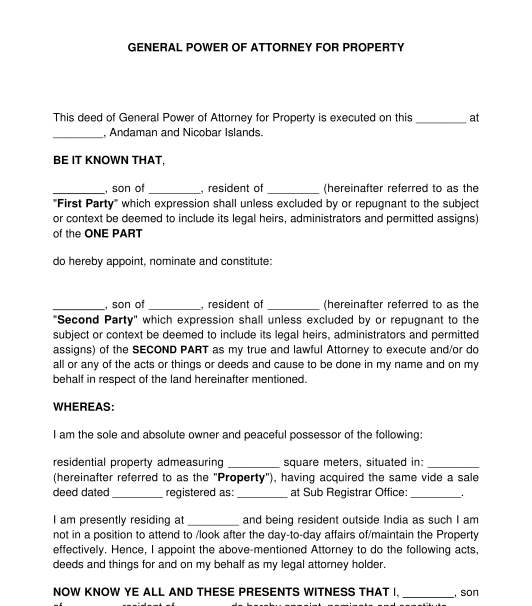 03-01-2025
03-01-2025

Answer a few questions and your document is created automatically.

Your document is ready! You will receive it in Word and PDF formats. You will be able to modify it.

 03-01-2025
03-01-2025
 Word and PDF
Word and PDF
 3 to 5 pages
3 to 5 pages
A general power of attorney for property is a legal document that allows a person or entity (the "principal") to nominate another person (the "attorney") to act on their behalf to manage their immovable properties.
The Power of Attorney is often created when the principal is:
A General Power of Attorney for Property grants the attorney the authority to manage the principal's immovable properties. This includes activities such as buying and selling real estate, property development, and obtaining necessary licenses and permissions.
On the other hand, a General Power of Attorney is used for delegating authority related to other general purposes including dealing banking transactions, legal representations, business formations, etc. and also, movable properties like cars, stocks, etc.
No, it is not mandatory. However, it is better if someone anticipates being unavailable to manage their property. Having a written Power of Attorney helps both the principal and attorney to be on the same page. The document can be used as proof of authority for the attorney to act on behalf of the principal even before courts and tribunals.
The principal means the person or entity granting the attorney the authority to manage the property on behalf of the principal.
The attorney is the person or entity who is authorized to act on behalf of the principal. The attorney is obligated to work on behalf of the principal as per the Power of Attorney for Property document.
The attorney cannot be granted any rights the principal does not have on the property or which is illegal including fraudulent activities, forging documents, etc.
The attorney cannot transfer or sell the property without due registration with local sub-registrat
Any person above the age of 18 years and entity registered in India can enter into a Power of Attorney.
The principal should not be under the influence of substances or undue pressure at the time of making the Power of Attorney. The principal can appoint multiple attorneys to manage the properties.
The Power of Attorney for Property can be created for:
- a specific period, for example, between two dates; or
- until a specific event occurs; or
- for a specific purpose, for example, to only deal with selling the principal's house.
The Power of attorney will be legally binding when it is printed on non-judicial stamp paper or e-stamp paper and signed by each party and has been dated. The value of the stamp paper would depend on the state in which it is executed. Each state in India has provisions in respect of the amount of stamp duty payable on a power of attorney. Information regarding the stamp duty payable can be found on the State government websites.
If the person creating the Power of Attorney is outside India at the time of creating this document, the Power of Attorney must be attested by the Indian Embassy or Consulate in the respective country.
Yes, if the Power of Attorney gives the principal the authority to dispose of the property through sale, conveyance, gift, relinquishment, etc. the document will only be valid when it is registered.
Registration must be done at the sub registrar's office, where the principal resides.
Yes, since most Power of Attorney is required to be registered, the registration is often done in the presence of two witnesses. The witnesses must be above the age of 18 years and competent to sign an agreement.
Yes, the General Power of Attorney for Property can be revoked or terminated as per the conditions outlined in the General Power of Attorney for Property and applicable laws. If the General Power of Attorney for Property is registered, then an application to terminate the General Power of Attorney for Property has to be submitted to the sub-registrar where the General Power of Attorney for Property was originally registered.
If the principal dies during the period of General Power of Attorney for Property, the General Power of Attorney for Property automatically gets terminated subject to the attorney not having any direct rights over the property.
The Power of Attorney should typically include:
The law relating to power of attorney is governed by the provisions of the Power of Attorney Act, 1882, Transfer of Property Act 1882, and the Indian Contract Act, 1872.
You fill out a form. The document is created before your eyes as you respond to the questions.
At the end, you receive it in Word and PDF formats. You can modify it and reuse it.
Guides to help you
General Power of Attorney for Property - Template
Country: India